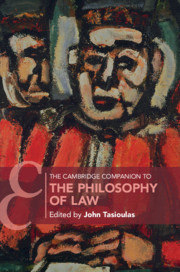Book contents
- The Cambridge Companion to the Philosophy of Law
- Cambridge Companions to Law
- The Cambridge Companion to the Philosophy of Law
- Copyright page
- Dedication
- Contents
- Contributors
- Introduction
- Part I General Theory
- Part II Values
- Part III Special Theory
- 12 Causation and Responsibility
- 13 Punishment
- 14 Constitutional Law
- 15 Civil Rights and Liberties
- 16 Criminal Law
- 17 Contract
- 18 Tort Law and Its Theory
- 19 Property Law
- 20 International Law
- Index
18 - Tort Law and Its Theory
from Part III - Special Theory
Published online by Cambridge University Press: 15 June 2020
- The Cambridge Companion to the Philosophy of Law
- Cambridge Companions to Law
- The Cambridge Companion to the Philosophy of Law
- Copyright page
- Dedication
- Contents
- Contributors
- Introduction
- Part I General Theory
- Part II Values
- Part III Special Theory
- 12 Causation and Responsibility
- 13 Punishment
- 14 Constitutional Law
- 15 Civil Rights and Liberties
- 16 Criminal Law
- 17 Contract
- 18 Tort Law and Its Theory
- 19 Property Law
- 20 International Law
- Index
Summary
For the best part of fifty years, theoretical reflection on the law of torts has been afflicted by a schism between ‘economic’ and ‘moral’ approaches. More than an affliction, the schism has become an obsession among many who place themselves on the ‘moral’ side. On the ‘moral’ side, many write with embarrassing defensiveness as if their main task were to see off the economistic threat. Those on the ‘economic’ side who react at all tend to react condescendingly. As this cartoon suggests, the economists hold greater cultural sway, and this lends them a certain swagger in their work that their adversaries generally lack.
- Type
- Chapter
- Information
- The Cambridge Companion to the Philosophy of Law , pp. 352 - 370Publisher: Cambridge University PressPrint publication year: 2020
- 1
- Cited by

